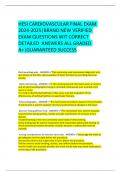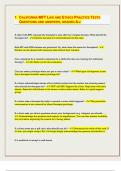HESI CARDIOVASCULAR FINAL EXAM
2024-2025|BRAND NEW VERIFIED
EXAM QUESTIONS WIT CORRECT
DETAILED ANSWERS ALL GRADED
A+|GUARANTEED SUCCESS
Electrocardiography - ANSWER-✅This commonly used noninvasive diagnostic test,
also known as the ECG, aids evaluation of heart function by recording electrical
activity.
Holter Monitoring - ANSWER-✅In this noninvasive test, the client wears a monitor
and an electrocardiographic tracing is recorded continuously over a period of 24
hours or more.
It is used to identify dysrhythmias if they occur and aids evaluation of the
effectiveness of antidysrhythmics or pacemaker therapy.
Echocardiography - ANSWER-✅This noninvasive procedure, based on the principles
of ultrasound, is used to evaluate structural and functional changes in the heart.
Exercise Testing (Stress Test) - ANSWER-✅This noninvasive test, used to evaluate
heart function during activity, reveals and aids classification of coronary artery
disease.
Treadmill testing is the most commonly used mode of stress testing.
Stress testing may be used in conjunction with myocardial radionuclide testing, at
which point the procedure becomes invasive, because a radionuclide must be
injected.
nursing considerations for exercise stress test - ANSWER-✅Encourage the client to
get adequate rest the night before the procedure.
Instruct the client to eat a light meal 2 hours before the procedure.
Tell the client to avoid smoking, alcohol, and caffeine before the procedure.
Ask the health care provider whether the client should take prescribed medications
on the day of the procedure.
,Instruct the client to wear nonconstrictive, comfortable clothing and supportive
shoes.
After the test, instruct the client to notify the health care provider if chest pain,
dizziness, or shortness of breath occurs.
Instruct the client to avoid hot baths or showers for at least 1 to 2 hours after stress
testing.
Cardiac Catheterization - ANSWER-✅A catheter is inserted to permit injection of a
dye into the heart and surrounding vessels to obtain
information about the structure and performance of heart valves and the circulatory
system.
nursing considerations cardiac catheterization - ANSWER-✅Withhold fluids and
food as prescribed.
Document the client's height and weight; this information will be needed to
determine the amount of dye to be administered.
Inform the client that a local anesthetic will be administered before catheter
insertion.
Warn the client that he or she may feel fatigued because of the need to lie still on a
relatively hard table for as long as 2 hours
.
Inform the client that he or she may feel a fluttery feeling as the catheter passes
through the heart; a flushed, warm feeling when the dye is injected; the desire to
cough; and palpitations caused by heart irritability.
restrict the client to bed rest as prescribed (the client may turn from side to side,
however); head elevation must be prescribed by the health care provider.
Keep the extremity extended and straight to prevent arterial occlusion for 4 to 6
hours as prescribed.
If an antecubital vessel was used, immobilize the arm with an arm board.
Percutaneous Transluminal Coronary Angioplasty - ANSWER-✅A coronary artery is
dilated with a balloon catheter to open the vessel lumen and improve arterial blood
flow; the procedure may be performed in multiple arteries.
Complications include arterial dissection or rupture, immobilization of plaque
fragments, spasm, and acute myocardial infarction.
Angioplasty requires a firm commitment on the client's part to stop smoking, lose
weight, get more exercise, and stop other behaviors resulting in the progression of
artery occlusion.
, Coronary Artery Stent - ANSWER-✅Placement of this device is performed to reduce
the risk of acute care vessel closure and to improve the long-term patency
.
A balloon catheter bearing the stent is inserted into the coronary artery and
positioned at the site of occlusion.
When placed in the coronary artery, the stent reopens the blocked artery.
coronary artery stent - ANSWER-✅Acute thrombosis is a major concern after the
procedure, and antiplatelet and anticoagulation therapy are prescribed for several
months afterward.
Joy is admitted to the cardiac telemetry unit for monitoring and observation. The
health care provider prescribes an echocardiogram to be performed at the bedside,
and the nurse prepares Joy for the procedure. Into which position does the nurse
assist Joy? - ANSWER-✅Left side-lying
Joy's cardiac status has remained stable during hospitalization, and the health care
provider decides that she should undergo an exercise stress test. Which instructions
does the nurse give Joy while explaining the test? Select all that apply. - ANSWER-
✅joy will need to ask her fiancé to bring her a pair of supportive shoes and loose-
fitting clothing.
Joy can ask to have the test stopped for excess fatigue, shortness of breath, leg
cramps, or angina
Joy experiences chest pain that radiates to her jaw during the stress test, and the
test is stopped. She is given a sublingual nitroglycerin tablet, which relieves the chest
pain. Joy is transported back to her hospital room and monitored closely. Joy's
health care provider schedules cardiac catheterization, to be performed the next day,
and the nurse prepares her for the test. Which information does the nurse give Joy?
- ANSWER-✅he catheter insertion site will have to be shaved and be antiseptically
prepared.
joy undergoes cardiac catheterization. The results indicate that her coronary
arteries are patent, and her health care provider determines that she can be
successfully treated with cardiac medications. Joy is transported to her hospital
room for postcatheterization care. Which interventions will the nurse plan to
implement in the immediate postcatheterization period? - ANSWER-✅Checking Joy's
pedal pulse in the affected extremity
Assessing postcatheterization vital signs per hospital policy
Calling the rapid-response team if dysrhythmias or chest pain occurs
, Coronary Artery Disease - ANSWER-✅Narrowing or obstruction of one or more
coronary arteries results from atherosclerosis, an accumulation of lipid-containing
plaque in the arteries.
Symptoms occur when the coronary artery is occluded to point that blood supply to
the muscle becomes inadequate, causing ischemia.
Coronary artery disease (CAD) results in hypertension, angina, dysrhythmias,
myocardial infarction, heart failure, and death.
The goal of treatment (which includes a low-fat diet, regular exercise, and
medications such as cholesterol-decreasing medications) is to slow the
atherosclerotic progression.
Coronary Artery Disease diet - ANSWER-✅Teach the client to consume a low-calorie,
low-sodium, low-cholesterol, low-fat diet with an increased amount of fiber.
Coronary Artery Disease Surgical Procedures - ANSWER-✅Percutaneous
transluminal coronary angioplasty is performed to compress the plaque against the
walls of the occluded artery and dilate the vessel.
Laser angioplasty vaporizes the plaque.
In atherectomy, the plaque is removed from the artery.
A vascular stent may be placed to prevent the artery from closing and prevent
further stenosis.
Coronary artery bypass grafting is performed to improve blood flow to myocardial
tissue at risk for ischemia or infarction resulting from occlusion of the artery.
coronary artery disease medications - ANSWER-✅Nitrates are used to dilate the
coronary arteries.
Calcium channel blockers are prescribed to dilate the coronary arteries and reduce
vasospasm.
Cholesterol-decreasing medications slow the development of atherosclerotic
plaques.
Beta-blockers are prescribed to reduce blood pressure in hypertensive clients
Angina - ANSWER-✅Angina is chest pain resulting from myocardial ischemia caused
by inadequate myocardial blood and oxygen supply.
Causes include obstruction of coronary blood flow resulting from atherosclerosis,
coronary artery spasm, and conditions increasing myocardial oxygen consumption.
angina assessment findings - ANSWER-✅Pain
Dyspnea





